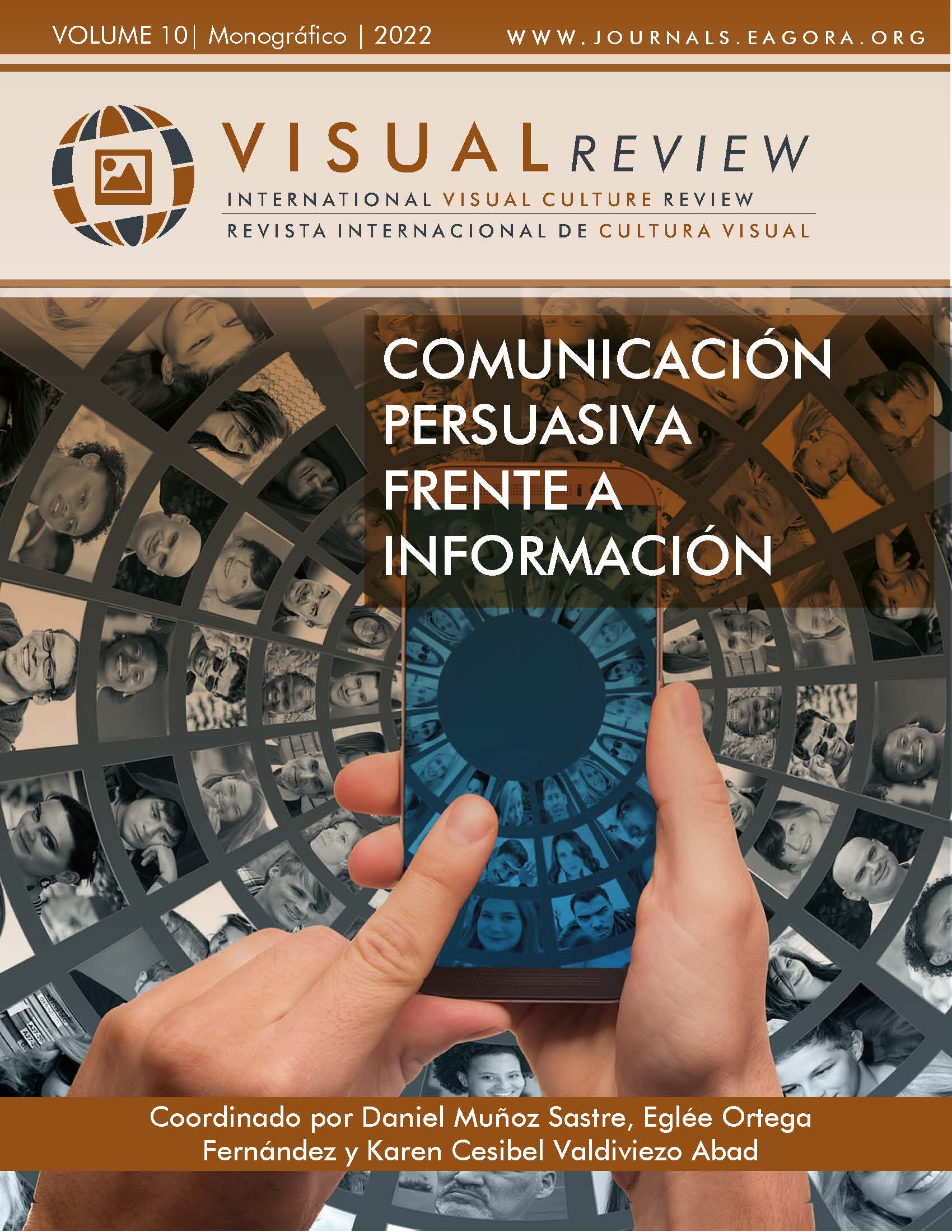COVID, Hoaxes and Factcheckers. Evolution of Denyings in Ibero-America 2020-2022
DOI:
https://doi.org/10.37467/revvisual.v9.3556Keywords:
COVID, coronavirus, factchecker, misinformation, pandemic, social communication, fake newsAbstract
This text analyses the activity of factcheckers linked to the LatamChequea Coronavirus network, from January 2020 to December 2021, trying to establish the chronology, typology, thematic and origin of demented fake news on coronavirus in Latin America, to understand the phenomenon of misinformation and help to recognize new bulos if patternsare actually detected in the demented of the fake news. The results reveal that the archetype missinformation has textual format, travels through social networks at the beginning of the pandemic, and it is demented in countries with greater activity of facktcheckers.
Downloads
Global Statistics ℹ️
|
529
Views
|
276
Downloads
|
|
805
Total
|
|
References
Adhanom Ghebreyesus, T. (2020, febrero 15). Discurso del Director General de la OMS en la Conferencia de Seguridad de Múnich. Conferencia de Seguridad de Múnich, Múnich. https://www.who.int/es/dg/speeches/detail/munich-security-conference
Brennen, J. S., Simon, F., Howard, P. N., & Nielsen, R. K. (2020). Types, sources, and claims of COVID-19 misinformation. Reuters Institute, 7, 3-1. https://www.ncbi.nlm.nih.gov/pmc/articles/PMC7645258/
Dafonte-Gómez, A., Míguez-González, M.-I., & Martínez-Rolán, X. (2022). Los factcheckers iberoamericanos frente a la COVID-19. Análisis de actividad en Facebook. Observatorio (OBS*), 16(1), 160-182. https://doi.org/10.15847/obsOBS16120221823 DOI: https://doi.org/10.15847/obsOBS16120221823
EPI-WIN, World Health Organization’s epidemic information network (2021). World Health Organization. https://www.who.int/teams/risk-communication/about-epi-win
Fighting the Infodemic: The #CoronaVirusFacts Alliance (2020). Poynter. https://www.poynter.org/coronavirusfactsalliance/
Hansson, S., Orru, K., Torpan, S., Bäck, A., Kazemekaityte, A., Meyer, S. F., Ludvigsen, J., Savadori, L., Galvagni, A., & Pigrée, A. (2021). COVID-19 information disorder: Six types of harmful information during the pandemic in Europe. Journal of Risk Research, 24(3-4), 380-393. https://doi.org/10.1080/13669877.2020.1871058 DOI: https://doi.org/10.1080/13669877.2020.1871058
Hernández-Sampieri, R.; Fernández-Collado, C., & Baptista-Lucio, P. (2010). Metodología de la investigación. McGraw Hill.
Krause, N. M., Freiling, I., Beets, B., & Brossard, D. (2020). Fact-checking as risk communication: The multi-layered risk of misinformation in times of COVID-19. Journal of Risk Research, 23(7-8), 1052-1059. https://doi.org/10.1080/13669877.2020.1756385 DOI: https://doi.org/10.1080/13669877.2020.1756385
La Vanguardia (2019). Pulitzer Bill Adair: El «fact-checking» es el periodismo de la era digital. La Vanguardia. 22 de julio. https://bit.ly/3NjtkNQ
Larson, H. J. (2020). A lack of information can become misinformation. Nature, 580(7803), 306. https://doi.org/10.1038/d41586-020-00920-w DOI: https://doi.org/10.1038/d41586-020-00920-w
LatamChequea Coronavirus (2020). Animal Político. 2 de abril. https://bit.ly/3sZWtpZ
López-Pujalte, C., & Nuño-Moral, M. V. (2020). La “infodemia” en la crisis del coronavirus: Análisis de desinformaciones en España y Latinoamérica. Revista Española de Documentación Científica, 43(3), e274-e274. https://doi.org/10.3989/redc.2020.3.1807 DOI: https://doi.org/10.3989/redc.2020.3.1807
Luminate (2020). Consumo y pago de noticias digitales: oportunidades y desafíos del modelo de suscripción en américa latina. https://bit.ly/3Lmhbqa
Posetti, J., & Bontcheva, K. (2020). Desinfodemia. Disección de las respuestas a la desinformación sobre el COVID-19 (N.o 2). UNESCO. https://bit.ly/37Mnbe2
Quintana-Pujalte, L., & Pannunzio, M. F. (2021). Fact-checking en Latinoamérica. Tipología de contenidos virales desmentidos durante la pandemia del coronavirus. Revista de Ciencias de la Comunicación e Información, 26, 27-46. https://doi.org/10.35742/rcci.2021.26.e178 DOI: https://doi.org/10.35742/rcci.2021.26.e178
Ramon-Vegas, X., Mauri-Ríos, M., & Rodríguez-Martínez, R. (2020). Redes sociales y plataformas de fact-checking contra la desinformación sobre la COVID-19. Hipertext.net, 21, 79-92. https://doi.org/10.31009/hipertext.net.2020.i21.07 DOI: https://doi.org/10.31009/hipertext.net.2020.i21.07
Rodríguez Zúñiga, M. (1975). Análisis de una serie histórica. Determinación de componentes y formulación de modelos interpretativos. Cuadernos de economía: Spanish Journal of Economics and Finance, 3(6), 93-139.http://hdl.handle.net/10486/6045
Sánchez-Duarte, J. M., & Rosa, R. M. (2020). Infodemia y COVID-19. Evolución y viralización de informaciones falsas en España. Revista española de comunicación en salud, 31-41. https://doi.org/10.20318/recs.2020.5417 DOI: https://doi.org/10.20318/recs.2020.5417
Sartori, G. (1998). Homo videns: La sociedad teledirigida. Taurus
Stencel, M., & Luther, J. (2020). Fact-Checking Census Archives. Duke Reporters’ Lab. https://reporterslab.org/tag/fact-checking-census/
Vosoughi, S., Roy, D., & Aral, S. (2018). The spread of true and false news online. Science, 359 (6380), 1146-1151. https://doi.org/10.1126/science.aap9559 DOI: https://doi.org/10.1126/science.aap9559
Zarocostas, J. (2020). How to fight an infodemic. The Lancet, 395(10225), 676. https://doi.org/10.1016/S0140-6736(20)30461-X DOI: https://doi.org/10.1016/S0140-6736(20)30461-X
Downloads
Published
How to Cite
Issue
Section
License
Those authors who publish in this journal accept the following terms:
-
Authors retain copyright.
-
Authors transfer to the journal the right of first publication. The journal also owns the publishing rights.
-
All published contents are governed by an Attribution-NoDerivatives 4.0 International License.
Access the informative version and legal text of the license. By virtue of this, third parties are allowed to use what is published as long as they mention the authorship of the work and the first publication in this journal. If you transform the material, you may not distribute the modified work. -
Authors may make other independent and additional contractual arrangements for non-exclusive distribution of the version of the article published in this journal (e.g., inclusion in an institutional repository or publication in a book) as long as they clearly indicate that the work was first published in this journal.
- Authors are allowed and recommended to publish their work on the Internet (for example on institutional and personal websites), following the publication of, and referencing the journal, as this could lead to constructive exchanges and a more extensive and quick circulation of published works (see The Effect of Open Access).














